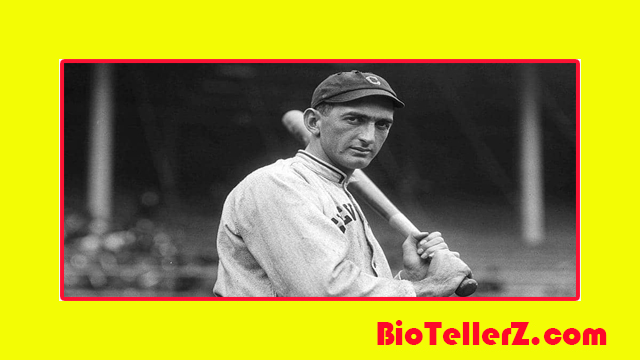Born in Greenville, South Carolina, on July 16, 1888, Joseph Jefferson Jackson is better known by his stage name Shoeless Joe Jackson. S., a highly regarded professional baseball player in the United States who passed away in Greenville on December 5, 1951, was ultimately disqualified from the game for his part in the 1919 Black Sox Scandal.

Shoeless Joe Jackson
Jackson was raised in extreme poverty and worked his first job in a cotton mill when he was just six years old. He never went to school. He eventually overcame a sickly childhood brought on by the lint-filled air in the mill, and grew tall and gangly with unusually long, powerful arms. At age 13, he was the youngest player ever on a mill team and was a superb baseball player. He acquired his nickname after developing blistered feet while breaking in a new pair of spikes (baseball shoes). Even Black Betsy, a locally hewn piece of hickory that was 36 inches long (91 cm), weighed 48 ounces (1 point 4 kg), was 12 ounces (340 grams) heavier than contemporary bats, and was covered in numerous tobacco juice splatters, became a part of his growing legend. He hit a triple to load the bases without them, which caused a fan of the opposing team to yell, “You shoeless bastard, you!”.
Connie Mack, the owner of the Philadelphia Athletics (A’s), paid $325 for Jackson’s contract with the Greenville Spinners in 1908, but Shoeless Joe Jackson, who was 19 at the time, got off the train. due to his homesickness for his 15-year-old wife Katie and his embarrassment over his hayseed illiteracy, he arrived at Richmond, Virginia, to catch the first train back to Greenville.
Jackson was sent to Savannah, Georgia, the following year by Mack, where he hit a league-best 358 dots. When called up to the A’s in Philadelphia, he was embarrassed by the persistent hazing of veteran teammates. Shoeless Joe turned down Mack’s offer to cover the cost of a tutor to assist him in learning to read and write. In 1910, he was traded to the Cleveland Naps, who would later become the Guardians.
During his first full season in the major leagues, he hit an amazing .407 for them. He enjoyed the city and developed a taste for the city’s fine dining and fashionable clothing. It was a funny irony that he adored expensive shoes. The public liked his pleasant, easygoing demeanor and his friendliness toward children. They found his collection of superstitious hairpins in his back pocket, his technique for strengthening his arms, which involved stretching Black Betsy as far as he could and holding it there, and his technique for strengthening his eye muscles, which involved focusing on a lit candle with one eye until his vision became blurry before switching to the other.
While this was going on, his skill and notoriety both increased. According to illustrious pitcher Walter Johnson, he was “the greatest natural ballplayer I’ve ever seen.”. Ty Cobb, the batting champion of the American League, acknowledged Jackson’s superior abilities. Both his stride into the pitch and his batting stance with his feet together were mimicked by Babe Ruth.
Jackson became the star player of the pennant-winning team in 1915 after being purchased by Chicago White Sox owner Charles Comiskey for $65,000. When the United States entered World War I, Jackson was the only source of income for his mother and wife, so he was unable to register for the draft. When he went to work in the shipyards as part of his war effort, he was derided as a coward and slacker.
The United States underwent change and grew increasingly cynical after the war. Major league baseball cities were open and free for baseball fixers and gamblers, and club owners hid any evidence of rigged games out of concern for the sport’s future popularity with the general public.
The White Sox were a group of underpaid, resentful players who were outraged by Comiskey’s miserliness, his failure to pay promised bonuses, and his haughty refusal to pay attention to their complaints despite the fact that they were the runaway pennant winners in 1919. Discord and hostile cliques also tore the group apart. In the end, former boxer Abe Attell and eight of its baseball players plotted with gamblers to give the Cincinnati Reds the World Series.
The athletes suffered terrible results from the fix, also known as the “Black Sox Scandal.”. The eight became disorganized and demoralized as a result of the gamblers’ failure to fulfill their promises to pay, and they got entangled in a web of lies. Jackson was given a $20,000 reward for throwing the series, which was more than three times his $6,000 yearly salary, but ultimately only received $5,000. However, it has never been clear how much he was involved in the scandal. He never returned the bribe, but he went on to hit an amazing .375 for the series and play faultless defense.
Comiskey refused to talk to Jackson when he tried to meet with him after the series to tell him about the fix. Jackson asked Katie to write letters of justification at home, but they never heard back. Typically, no details about the fix were made public until a year after the bubble finally burst. In an effort to make sense of what had previously eluded him, Jackson confessed when the grand jury was summoned. It is claimed that a young boy there, outside the grand jury room, uttered the pleading words “Say it ain’t so, Joe,” which later became a part of American slang. “.
The eight baseball players were tried and found not guilty; however, Judge Kenesaw Mountain Landis, the newly appointed commissioner of baseball, forbade them from ever again participating in professional baseball.
Related Posts
Donald Trump – Best Guide in 2023
